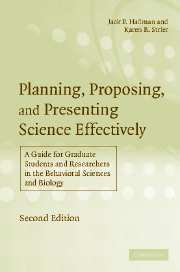 Planning, Proposing, and Presenting Science Effectively
Planning, Proposing, and Presenting Science Effectively A - How to write clearly
Published online by Cambridge University Press: 01 September 2010
Summary
Care should be taken, not that the reader may understand, but that he must understand.
Quintilian (c. 35–95)This appendix could be called “Some tips on how to write clearly” because it cannot – and does not attempt to – replace detailed guides on the subject of English exposition. We focus instead on issues and problems that arise frequently in scientific writing, as in grant proposals (Chapter 2) and research reports (Chapter 3).
Many writing guides are biased towards being prescriptive rather than descriptive. That is, they prescribe what writers should do rather than describing what writers do. Part of this bias results from the very nature of such guides; it is easier and shorter to say what to do than it is to explain why or to show that good writers do things in the way prescribed. The other part of the bias results from selection: those who write guides tend to be philosophically prescriptive about language.
It is with some trepidation that we offer these notes about how to write clearly because they inevitably appear, and often are, prescriptive. English has become the world language because it is forgiving in so many ways. Any writer can violate many of the so-called rules and still be understood. Truly good writers see through awkward prescriptions. For example, everyone knows the following “rule:” never use a preposition to end a sentence with.
- Type
- Chapter
- Information
- Planning, Proposing, and Presenting Science EffectivelyA Guide for Graduate Students and Researchers in the Behavioral Sciences and Biology, pp. 165 - 202Publisher: Cambridge University PressPrint publication year: 2006
